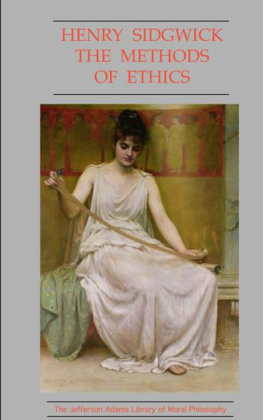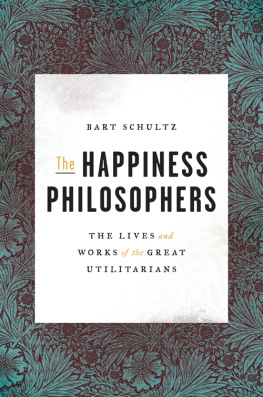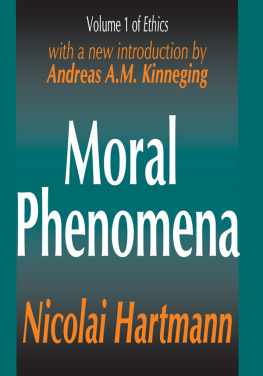Henry Sidgwick - Methods of Ethics
Here you can read online Henry Sidgwick - Methods of Ethics full text of the book (entire story) in english for free. Download pdf and epub, get meaning, cover and reviews about this ebook. year: 1981, publisher: Hackett Pub Co Inc, genre: Science. Description of the work, (preface) as well as reviews are available. Best literature library LitArk.com created for fans of good reading and offers a wide selection of genres:
Romance novel
Science fiction
Adventure
Detective
Science
History
Home and family
Prose
Art
Politics
Computer
Non-fiction
Religion
Business
Children
Humor
Choose a favorite category and find really read worthwhile books. Enjoy immersion in the world of imagination, feel the emotions of the characters or learn something new for yourself, make an fascinating discovery.
- Book:Methods of Ethics
- Author:
- Publisher:Hackett Pub Co Inc
- Genre:
- Year:1981
- Rating:3 / 5
- Favourites:Add to favourites
- Your mark:
- 60
- 1
- 2
- 3
- 4
- 5
Methods of Ethics: summary, description and annotation
We offer to read an annotation, description, summary or preface (depends on what the author of the book "Methods of Ethics" wrote himself). If you haven't found the necessary information about the book — write in the comments, we will try to find it.
Methods of Ethics — read online for free the complete book (whole text) full work
Below is the text of the book, divided by pages. System saving the place of the last page read, allows you to conveniently read the book "Methods of Ethics" online for free, without having to search again every time where you left off. Put a bookmark, and you can go to the page where you finished reading at any time.
Font size:
Interval:
Bookmark:
The source for the text is the seventh edition (1907), published by Macmillan and Company, London. The footnotes have been integrated into the main text, marked off by square brackets.
This ebook edition was published in 2011. The painting on the cover of this ebook is Neaera Reading a Letter from Catullus (1894) by Henry John Hudson. (Hudson also did a famous portrait of Sidgwick.) The publisher may be contacted at ja.moral.library@gmail.com.
Ethics is a department of the Theory or Study of Practice.
It is the study of what ought to be, so far as this depends upon the voluntary action of individuals
In deciding what they ought to do, men naturally proceed on different principles, and by different methods.
There are two prima facie rational Ends, Excellence or Perfection and Happiness: of which the latter at least may be sought for oneself or universally. It is also commonly thought that certain Rules are prescribed without reference to ulterior consequences. The Methods corresponding to these different principles reduce themselves in the main to three, Egoism, Intuitionism, Utilitarianism.
These methods we are to examine separately, abstracting them from ordinary thought, where we find them in confused combination, and developing them as precisely and consistently as possible
In considering the relation between Ethics and Politics, we have to distinguish between Positive Law and Ideal Law.
But at any rate the primary object of Ethics is not to determine what ought to be done in an ideal society: it therefore does not necessarily require as a preliminary the theoretical construction of such a society.
By Reasonable' conduct---whether morally or prudentially reasonable---we mean that of which we judge that it ought' to be done. Such a judgment cannot be legitimately interpreted as a judgment concerning facts, nor as referring exclusively to the means to ulterior ends: in particular, the term ought', as used in moral judgments, does not merely signify that the person judging feels a specific emotion:
nor does it merely signify that the conduct in question is prescribed under penalties:
The notion expressed by ought'', in its strictest ethical use is too elementary to admit of formal definition, or of resolution into simpler notions: it is assumed to be objectively valid; and judgments in which it is used when they relate to the future conduct of the person judging, are accompanied by a special kind of impulse to action.
This dictate of reason' is also exemplified by merely prudential judgments; and by merely hypothetical imperatives.
The psychological doctrine, that the object of Desire is always Pleasure, is liable to collide with the view of Ethical judgments just given: and in any case deserves careful examination.
If by pleasure'' is meant agreeable feeling'', this doctrine is opposed to experience: for throughout the whole scale of our desires, from the highest to the lowest, we can distinguish impulses directed towards other ends than our own feelings from the desire of pleasure:
as is further shown by the occasional conflict between the two kinds of impulse.
Nor can the doctrine derive any real support from consideration either of the unconscious' or the original' aim of human action.
The Kantian identification of Free' and Rational' action is misleading from the ambiguity of the term freedom'.
When, by definition and analysis of voluntary action, the issue in the Free Will Controversy has been made clear, it appears that the cumulative argument for Determinism is almost overwhelming:
still it is impossible to me in acting not to regard myself as free to do what I judge reasonable. However the solution of the metaphysical question of Free Will is not important---Theology apart---for systematic Ethics generally:
it seems however to have a special relation to the notion of Justice:
The practical unimportance of the question of Free Will becomes more clear if we scrutinize closely the range of volitional effects.
The Methods indicated in chap. i. have a prima facie claim to proceed on reasonable principles: other principles seem, in so far as they can be made precise, to reduce themselves to these:
especially the principle of living according to Nature''.
In short, all varieties of Method may conveniently be classed under three heads: Intuitionism and the two kinds of Hedonism, Egoistic and Universalistic. The common confusion between the two latter is easily explained, but must be carefully guarded against.
To got a clear idea of what is commonly known as Egoism, we must distinguish and exclude several possible meanings of the term:
and define its end as the greatest attainable surplus of pleasure over pain for the agent,---pleasures being valued in proportion to their pleasantness.
I apply the term Intuitional---in the narrower of two legitimate senses---to distinguish a method in which the rightness of some kinds of action is assumed to be known without consideration of ulterior consequences.
The common antithesis between Intuitive and Inductive is inexact, since this method does not necessarily proceed from the universal to the particular. We may distinguish Perceptional Intuitionism, according to which it is always the rightness of some particular action that is held to be immediately known:
Dogmatic Intuitionism, in which the general rules of Common Sense are accepted as axiomatic:
Philosophical Intuitionism, which attempts to find a deeper explanation for these current rules.
Another important variety of Intuitionism is constituted by substituting for right'' the wider notion good''.
The common judgment that a thing is good'' does not on reflection appear to be equivalent to a judgment that it is directly or indirectly pleasant.
Good'' = desirable'' or reasonably desired'': as applied to conduct, the term does not convey so definite a dictate as right'', and it is not confined to the strictly voluntary.
There are many other things commonly judged to be good: but reflection shows that nothing is ultimately good except some mode of human existence.
The Principle of Egoistic Hedonism is the widely accepted proposition that the rational end of conduct for each individual is the Maximum of his own Happiness or Pleasure.
There are several methods of seeking this end: but we may take as primary that which proceeds by Empirical-reflective comparison of pleasures.
In this method it is assumed that all pleasures sought and pains shunned are commensurable and can be arranged in a certain scale of preferableness:
pleasure being defined as feeling apprehended as desirable by the sentient individual at the time of feeling it''.
To let a clearer view of this method, let us consider objections to show its inherent impracticability; as, first, that pleasure as feeling cannot be conceived, and that a sum of pleasures is intrinsically unmeaning'':
that transient pleasures cannot satisfy, and that the predominance of self-love tends to defeat its own end:
that the habit of introspectively comparing pleasures is unfavourable to pleasure:
that any quantitative comparison of pleasures and pains is vague and uncertain, even in the case of our own past experiences:
that it also tends to be different at different times: especially through variations in the present state of the person performing the comparison:
that, in fact, the supposed definite commensurability of pleasures is an unverifiable assumption:
that there is a similar liability to error in appropriating the experience of others; and in inferring future pleasures from past.
It may seem that the judgments of Common Sense respecting the Sources of Happiness offer a refuge from the uncertainties of Empirical Hedonism: but there are several fundamental defects in this refuge;
Next pageFont size:
Interval:
Bookmark:
Similar books «Methods of Ethics»
Look at similar books to Methods of Ethics. We have selected literature similar in name and meaning in the hope of providing readers with more options to find new, interesting, not yet read works.
Discussion, reviews of the book Methods of Ethics and just readers' own opinions. Leave your comments, write what you think about the work, its meaning or the main characters. Specify what exactly you liked and what you didn't like, and why you think so.










